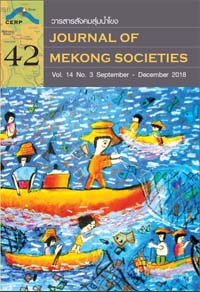Ethnic Tourism: Mon Ethnic Identity and Economic Opportunity Generation
Main Article Content
Abstract
This article examined ethnic tourism in a Mon community, using applied ethnic tourism concepts and debates associated with economic opportunities and ethnic identity as an analytical framework. The study employed qualitative research methodology, including both relevant secondary data and fieldwork at Wang Ka village, Kanchanaburi province during 2014-2015. The results indicate that this group of Mon migrated to Thailand in 1948. Battling between Burmese military and the ethnic groups was the main cause of cross-border migration. These diasporic Mon have maintained their customs, architecture and identity. Since 2008, the government has promoted Wang Ka as an ethnic tourist attraction. The highlight of this tourist attraction is Mon “traditional culture” which creates economicopportunities for these Mon people. In this context, the Mon in Wang Ka construct their identities to meet the expectations of tourists. At the same time, they also maintain their customs so as to keep cultural meanings and values, which, in return, attract tourists. Based on the experiences of Mon in Ban Wang Ka, ethnic tourism can both generate economic opportunities and help to maintain ethnic identity.


